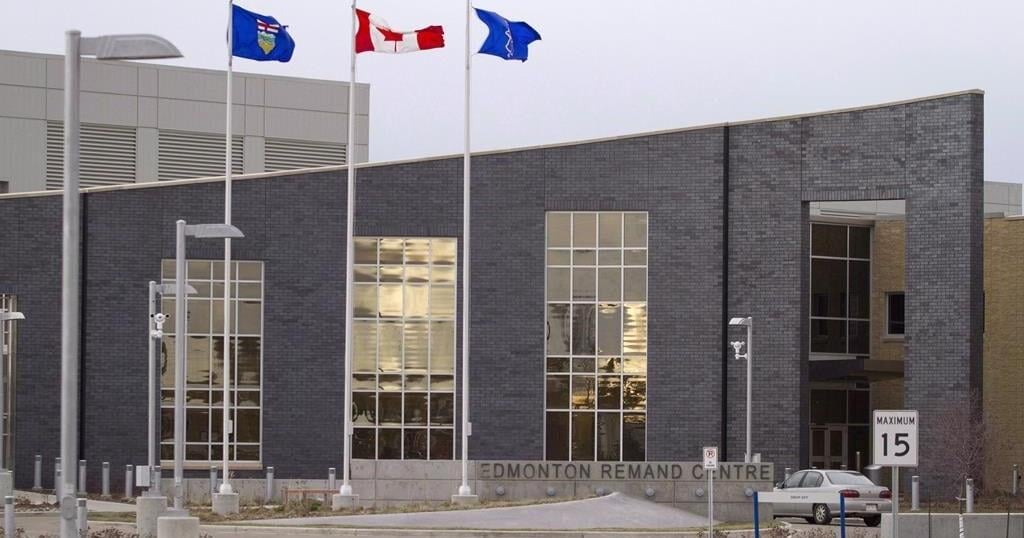EDMONTON – New data shows Alberta spends the lowest amount of money per inmate in Canada – a number the province says is value for money but critics label short-sighted and worrisome.
The numbers, published by Statistics Canada earlier this month, show Alberta spends $193 per day per inmate.
Saskatchewan spends $199.
Almost every other province and territory puts in over $300.
The numbers account for costs like salaries for guards and life necessities for inmates. They apply only to correctional centres, remand centres, people in custody awaiting trial, and those serving prison sentences shorter than two years.
The numbers are for 2022-23 and Statistics Canada, in its online report, says inferences “should be made with caution” given some provinces may calculate their overall expenditures differently.
But former prison watchdog Howard Sapers says the Alberta gap compared with other provinces is too big to be dismissed out of hand as just accounting and infrastructure.
Sapers said it suggests Alberta is underspending on correctional staff along with programs and supports for inmates after they’re released.
“This is important not just for those who have concerns about what is going on behind prison walls but also for those who are concerned about public safety,” Sapers, who served as the Correctional Investigator of Canada from 2004 to 2016, said in an interview.
“There is a relationship between what you invest and what you get out of it.”
Justin Piché, a University of Ottawa professor who studies incarceration, said he believes Alberta’s comparatively low spending level is also a result of the Edmonton Remand Centre — the largest jail in Canada — relying on surveillance cameras to reduce staffing costs.
“The way that they’ve done it makes it cheaper to run than other models that exist across the country,” Piché said.
That’s not necessarily a good thing, he said.
“A facility that’s more bereft of human interaction is going to be more inhumane than others,” said Piché. “Human beings need human connection, and in these giant facilities there’s fewer opportunities for that.”
Since the Edmonton Remand Centre opened in 2013, multiple inquiries into inmate deaths have led judges to call for more staffing and face-to-face contact.
An inquiry into the 2020 suicide of Jonathan Anderson led Justice Marilena Carminati to say in a report last week that unless additional mental health staff are hired, “similar deaths are likely to occur.”
The report says that as of 2022, there were 16 mental health workers employed at the remand centre, which can hold 1,500 inmates.
During the inquiry, an employee testified that the remand centre’s mental health unit had been short-staffed for years.
Another inquiry into an inmate suicide led Justice Joyce Lester to recommend in 2022 that additional officers staff the male mental health unit at all times.
Lawyers for the centre, in a response letter, rejected that suggestion, saying extra staffing was not necessary and that it “cannot guarantee the unit be staffed at all times by a minimum of two officers during day and afternoon shift.”
Arthur Green, spokesman for Alberta Public Safety Minister Mike Ellis, declined to answer an emailed question on why Alberta has the lowest daily cost.
In a statement, Green said the province is committed to the health and safety of those in correctional and remand centres, but “at the same time, we are responsible and accountable to taxpayers.”
Green pointed to four correctional centres that opened therapeutic living units in 2023.
“These units provide addiction treatment programs to inmates suffering from addiction and supports them in their pursuit of recovery,” he said.
“The intensive programming supports their mental health and ensures they can continue with a co-ordinated network of personalized, community-based services even after their sentences are complete.”
Green said work is always evolving to rehabilitate inmates while keeping the public safe.
Piché, as well as Chris Hay, the president of the John Howard Society of Alberta, say the Alberta government should look at investing in crime prevention programs, as well as programs that help offenders get back on their feet after they’re released.
Hay noted that investing in reintegration support is something the Alberta government is starting to do, albeit slowly.
His organization recently received $500,000 from the province to pilot a program at the Lethbridge Correctional Centre in southern Alberta.
The program, mirroring one in Ontario, involves every inmate working with a case manager before being released while also pairing those inmates up with non-profit organizations to access support and resources after they get out.
“It’s a step in the right direction,” Hay said. “We’re starting slow, but the Alberta government is playing the game here.”
Hay said programs like what his organization is piloting are key to reducing recidivism, which refers to the likelihood a former inmate will continue to commit crimes upon release.
He said recidivism can’t be divorced from the justice system: the more effort that goes into punishment, the higher the chance inmates will reoffend.
Alberta doesn’t prioritize rehabilitation, he said.
“(It) puts a higher priority on enforcement and punishment.”
This report by The Canadian Press was first published Sept. 27, 2024.
